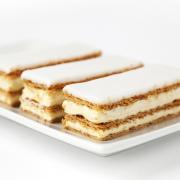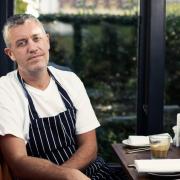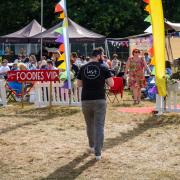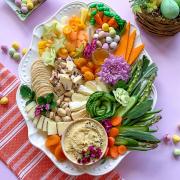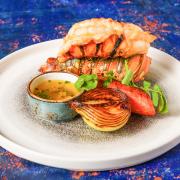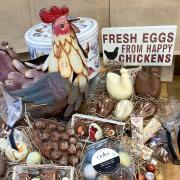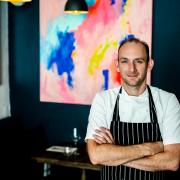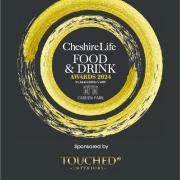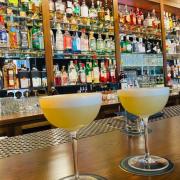Bottling a summer’s day in Cheshire is no mean feat but former IT whizz Crispin Reeves has come as close as anyone to managing it. Although he claims he’s not a bee farmer, he has established himself on the honey scene with his Haughton Honey

‘I was a real techie in the early days of the internet,’ Crispin said. ‘I had one of the first IP addresses in the UK but after a number of years I decided to hand in my notice, return to Cheshire and try my hand at farming.’
Initially rearing rare breed cattle and sheep, Crispin began keeping bees as a hobby and from there the business grew.
‘It’s a hobby gone wrong,’ he said. ‘I’d never tried anything like it, but I was curious to learn more about bees and the mysterious art of beekeeping. I wasn’t looking to commercialise my bees, but I spotted an opportunity in the market for a new honey product.’
Five years later Haughton Honey or, as Crispin calls it ‘spring and summer in a jar’, is going from strength to strength.
Based at Radmoor farm in the village of Haughton, the product is a mix of some of the finest bee honey from across the North West.
‘Our bees roam across Cheshire and surrounding counties, pollinating all sorts of wild plants,’ Crispin said. ‘Our honey comes from meadows, gardens, trees and farmland and contains pollen from dandelion, hawthorn, chestnut, lime, blackberry and many other native wildflowers.’
Working with other bee farmers in the area, he has helped to form a ‘honey cooperative’, with 1,600 hives producing Haughton Honey.
‘Our honey is raw; pretty much straight from the hive and into the jar,’ he said. ‘The product you find in the supermarket is a blend of EU and non-EU honey, which is heated to keep it runny, removing all its goodness. By harvesting the honey in the traditional way, we preserve its natural taste and texture.’
Haughton honey is slightly granulated, has a thicker consistency and crystallises in the jar. It also contains the honey’s natural enzymes and proteins.
‘We don’t look to sell to supermarkets,’ added Crispin. ‘Our product is for honey lovers, which is why you’ll find us in farm shops, restaurants and small, independent stores across the UK.
‘Once you’ve tasted a quality honey, you’re hooked – we have a number of regular customers who can’t get enough of Haughton honey.’
Crispin’s most dedicated customers, affectionately known as the Honey Monsters, regularly buy multiple jars of Haughton honey to satisfy their appetite for the sweet stuff.
‘I have a number of customers who buy three jars of our honey a week; they eat it with most meals, as well as straight out of the jar. My most intriguing customer is a gentleman who pops in every few weeks to buy a 3kg bucket of honey. He promises it’s solely for his own consumption, but who knows?
‘Personally, I think our honey works well spread on toast, as a sugar supplement in tea and coffee or, if you’re feeling indulgent, raw from the jar with a spoon!’
As well as being a tasty Cheshire treat, Haughton honey is a member of the Guild of Fine Foods, has been nominated for this year’s Great Taste Awards and has been invited to this year’s RHS Flower Show at Tatton Park.
‘It’s a great honour to have been selected as one of the 30 artisan producers at the RHS Tatton Flower Show,’ Crispin said. ‘Honey and bees are synonymous with all things floral and we’ll be proud to promote our honey.’
Despite these accolades, he is keen to highlight the hard work of the bees that make the delicious Haughton Honey. ‘Without our bumblebees, so much of our plant life wouldn’t exist,’ he said. ‘Five pence from every jar of Haughton Honey sold goes to the Bumblebee Conservation Trust, to help protect these wonderful creatures.’
* To find out more about Haughton Honey, or to a buy a jar, go to haughtonhoney.com and for more information on the Bumblebee Conservation Trust, visit bumblebeeconservation.orgDid you know?
* The first record of humans harvesting honey dates from 6000BC when humans would hunt for bees’ nests.
* Research suggests that honey has a number of healing properties, which could help skin infections, stomach ulcers and allergies.
* Bees forage up to four miles for food, collecting nectar and pollen from flowers. It is estimated that it takes up to 10million foraging trips to make the equivalent of a jar of honey.
80 per cent of food found on the shelves of a supermarket is there due to bee pollination – without them, we would struggle to survive.
All facts taken from the International Bee Research Association




